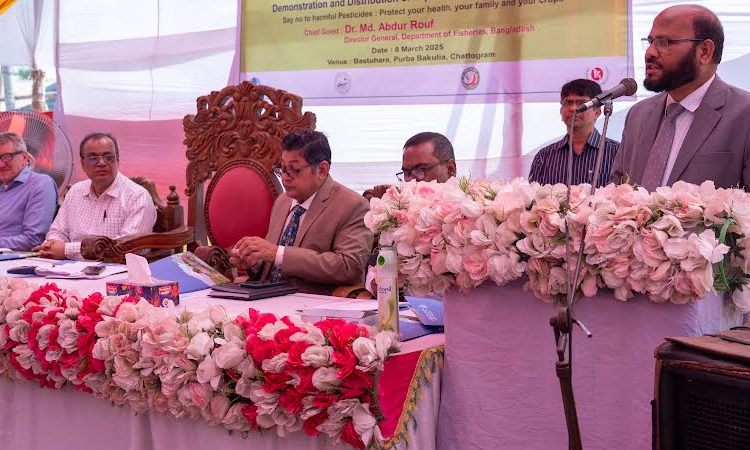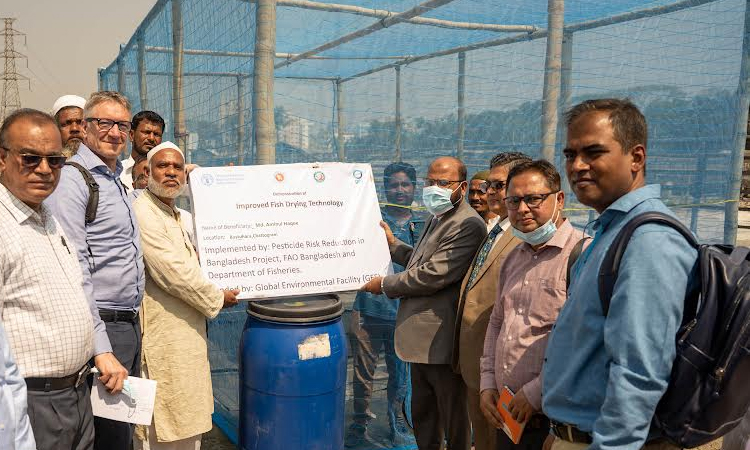News Flash
News Flash

CHATTOGRAM, March 8, 2025 (BSS) - The Food and Agriculture Organization of the United Nations (FAO) organised an inaugural ceremony for demonstration and distribution of improved fish drying technology amongst the Department of Fisheries in Chattogram today.
The event marked a major milestone in FAO's ongoing efforts to improve fish drying practices and ensure better economic, health, and environmental outcomes for the local fishing communities, a FAO press release said.
According to the Bangladesh Fisheries Statistics Yearbook, in 2023, Bangladesh produced 0.71 million tons of dried fish (about 15pc of the total fish production of 4.76 million tons), comprising 85pc marine and 15 pc freshwater.
To strengthen capacity of stakeholders in the production of high quality safe dried fish products for consumers at home and abroad, adoption of alternative technology for dried fish production is crucial.
It is also integral to process to reduce exposures of harmful chemicals and pesticides during traditional sun drying and marketing of dried fish.
Traditional sun drying of fish in Bangladesh is climate dependent and done at open spaces where insect infestations by beetle and fly are a real problem. Hazardous pesticides or chemicals are often used as a cheaper solution to eliminate insects during drying and storage of dried fish that pose serious public health risks.

To overcome these health risk issues and encourage mass adaptation of an alternative fish drying technology, improved drying rack covered by mosquito net were arranged to be distributed in selected areas of Bangladesh.
Md Abdur Rouf, Director General, Department of Fisheries; and Martijn Van DE Groep, Senior Technical and Policy Advisor, FAO Bangladesh; graced the event with their presence.
The event was chaired by Md Anwar Hossain, Deputy Director, DoF, Chattogram.
Through this programme, FAO introduced and will distribute 93 improved fish drying racks across the country. These innovative drying systems are part of a larger initiative that seeks to promote sustainable fishing practices, enhance the quality and marketability of dry fish products, and reduce post-harvest losses. The initiative is done under FAO's Global Environment Facility (GEF) funded Pesticide Risk Reduction in Bangladesh project.
This initiative targets communities in Bangladesh where dry fish production is a primary source of livelihood.
Recipients will also receive specialised training on effective use and maintenance of these new drying racks. In addition to the distribution, there will be multiple workshops focused on proper fish drying techniques, hygiene practices, and methods to boost the quality of dried fish products for better marketability.
Md Abdur Rouf stated, "The dry fish sector contributes 2.43% to the national GDP, 22.14pc to the agricultural GDP and 1.05% to the total national exports."
"By generating foreign exchange and bolstering the local economy, dry fish has already become a significant contributor to the country's economic development. We need to provide training and support to make sure that our fishermen have necessary skills and knowledge to do their tasks effectively," he said.
Martijn Van De Groep, Senior Technical and Policy Adviser, emphasised the importance of adaptation of newly invented fishing technologies.
"FAO's work in sustainable fisheries includes the development and promotion of standards and good practices to achieve an equitable and compliant sector. Today's initiative is a step towards making Bangladesh become more sustainable in the global dry food business," he said.